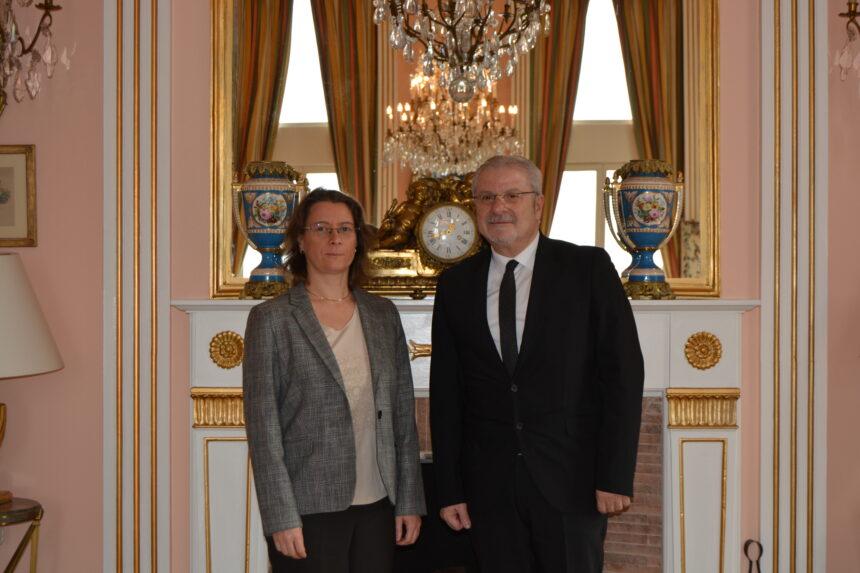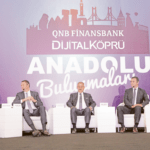French Ambassador to Turkey Isabelle Dumont said that the Customs Union between Turkey and the European Union (EU) is a “key” issue, but that despite the progress made, some existing trade disputes are delaying prospects.
In an interview with EKONOMİ daily, French Ambassador to Turkey Isabelle Dumont evaluated the relations between the two countries from the past to the present.
“The resumption of negotiations on the modernization of the Customs Union depends in particular on the resolution of trade irritants. We cannot explain to anyone the resumption of negotiations without resolving the existing issues” Dumont said.
Dumont also stated that the bilateral trade between Turkey and France is set to break a record this year by exceeding EUR 20 billion. “French companies Turkey investments are expanding” Dumont said.
France and Turkey have a deep-rooted history of bilateral relations, how do you see the present and the future of the relationship?
You are right to underline the historical dimension of France-Turkey relations. The first French Ambassador to Turkey was appointed in Istanbul in 1535, almost 500 years ago, and since then, except for the years of World War I, there has never been a break in relations. France was even the first European country to recognize Mustafa Kemal’s government in 1921. Beyond this institutional dimension, the two nations have had ongoing interactions in the fields of language, ideas, art, culture and knowledge. Turkey is undoubtedly home to the largest number of Francophone educational institutions among non-French speaking countries. These include the Galatasaray High School and University. In addition, our economic relations continue to flourish. All this is a solid and stable foundation, whatever the political agenda. Our work today is about preserving that foundation, but also enriching it by cooperating on notably the reconstruction of the areas affected by the February 6 earthquakes, sustainable development issues on a more global scale, and even on artificial intelligence.
Can you evaluate France’s bilateral economic and trade relations with Turkey?
The intensification of bilateral trade relations between France and Turkey has ensured that the target set by Presidents Hollande and Erdoğan in 2014 for a trade volume of EUR 20 billion euros per year is reached in 2022. 2023 will set a new record. According to French customs, bilateral trade in the first nine months of this year exceeded EUR 17 billion. Our trade relations are balanced and sectorally diversified, with a slight trade surplus for Turkey. The French and Turkish industrial value chains are largely intertwined, as evidenced by trade in the automotive sector.
We know that the French Development Agency (FDA) and your Economic Counselor’s Office are working on the contribution of French and Turkish-French joint ventures to the Turkish economy. Can you give an overlook on the recent state of these investments?
France is today one of the largest investor countries in Turkey with more than 400 companies based here, representing more than EUR 5 billion in investments and about 320,000 indirect jobs. Our companies contribute EUR 3.3 billion directly to the added value of the Turkish economy and EUR 8.3 billion, or 1.3 percent of Turkey’s GDP, taking into account the investment, production, exports and employment they create.
Due to the very strong potential of the Turkish market and Turkey’s strategic position in the region, many French companies are expanding their investments in Turkey. At a time when European companies are seeking to diversify and secure their global value chains, Turkey is attracting investors looking to move closer to the European market. Turkey enjoys significant comparative advantages in the eyes of French companies. However, continued improvement of economic governance and better respect for intellectual property rights will facilitate a significant strengthening of the local presence of French companies.
How do you assess Turkey-EU relations, which have been troubled and at times put on the back burner, and do you think a ‘positive agenda’ can be created to keep hopes alive?
I would not say that EU-Turkey relations have been shelved, although there have been significant challenges. The positive agenda you mentioned was proposed by the European Council as early as 2021, with a clear framework. And as the European Commission recently emphasized in its statement on relations between Turkey and the European Union, there are certainly many areas where the potential for cooperation is enormous – economic exchanges, energy, migration, to give just a few examples. I would also like to add that the European Political Community, which was created in 2022 on the initiative of our President Emmanuel Macron to discuss security issues between European countries (not only EU member states), is a platform for exchange and cooperation in which Turkey is fully involved. Of course, as I said, this agenda can only be useful and functional if it is set within a framework that is clearly defined by the European Council and takes into account the interests of both Turkey and the EU member states.
What are France’s views on both the revitalization of negotiations on Turkey’s membership of the European Union and the launch of the process of updating the Customs Union?
The criteria for accession negotiations are well known to all candidate countries, in particular the rule of law, fundamental freedoms and human rights, and France has always been very committed to these criteria. As for the Customs Union, it is a key issue for the European Union and for Turkey, given the importance of our trade partnership and how intertwined our value chains are. Modernization of the agreement is a legitimate aspiration, but there are still some trade disagreements despite the progress made, especially in 2022. We remain convinced that progress on this issue would be beneficial.
Are there any issues that you think could be on the agenda of the Customs Union modernization process that are causing problems in Turkey-France trade relations?
The resumption of negotiations on the modernization of the Customs Union (CU) depends in particular on resolving the trade irritants. We cannot explain to anyone the resumption of negotiations without resolving the existing issues. On the other hand, it is vital that Turkey takes additional measures to stop the re-export of goods to Russia that could fuel its war of aggression against Ukraine.
MTP, ALIGNED WITH GREEN TRANSFORMATION GOALS
Which areas does France see as important for the future of economic relations? What are the promising new areas of cooperation between the two countries in your opinion?
Energy and environmental cooperation is one of the pillars of France-Turkey bilateral relations. For example, the French Development Agency is one of the stakeholders in the Climate Protocol signed by Turkey with the World Bank and KfW at the end of 2021, through which it has committed EUR 800 million for 2022-2024 to support Turkey’s efforts towards a low-carbon economy. In addition to this institutional support, I would like to highlight the cooperation between the French and Turkish private sectors, as evidenced for example by the partnership signed this summer between TotalEnergies and Rönesans Holding for the joint development of renewable energies in Turkey. Another important pillar of our bilateral relationship is the technology sector. France is one of the leading countries in Europe in terms of technology. It is home to more than 20,000 start-ups, with revenues of EUR 14 billion in 2022. France already has 29 Unicorn startups and has an ambitious goal to increase this number to 100 by 2030. The startup ecosystem is also developing rapidly in Turkey. Therefore, cooperation between the two countries’ ecosystems will undoubtedly be fruitful. In this context, France has already established many partnerships with Turkey, as evidenced by the presence of two Ecole 42 schools opened in Istanbul and Kocaeli. The French Tech community in Turkey, which has the support of the French authorities, is very active here. Present in Turkey since 3 years, the French Tech community already brings together 250 active members and has so far supported 7 Turkish start-ups. I would like to mention that greening and digital transformation are two important axes of Turkey’s medium-term program announced in early September. Therefore, our goals in this area are perfectly aligned.
How do you see Turkey’s ties with NATO being considered in the context of EU relations?
Turkey has been an ally of France since 1952 within the framework of NATO, of which most of the European Union member states are also members. Together with our other Euro-Atlantic partners, we do a lot of joint work for peace and security. For example, in Kosovo, where the Turkish and French armies are deployed together in the NATO force KFOR. Ankara makes an important contribution to the Alliance, especially in terms of capability and budget. With the Turkish authorities, we wish to deepen the dialogue that is necessary between allies, which always exists and allows us to overcome our differences when necessary. It is in our common interest to strengthen NATO as the guarantor of our security and the stability of the Euro-Atlantic region and to enhance its complementarity with the European Union, especially in a context where war is returning to European soil.
As the daughter of Prof. Paul Dumont, who has conducted profound and distinguished studies on Ottoman-Turkish history and culture, and as an Ambassador who knows Turkey and is fluent in Turkish, how do you see today’s Turkey?
Turkey is a very important country for France, with which we have deep historical relations and very close cultural ties. It is a very big country, very complex and very diverse in terms of its population, habits and traditions. For me, representing France in this country is an honor but also a special feeling because Turkish smells, music and cuisine are part of my childhood. Having been here several times at a very young age, following my father, and most recently, ten years ago, as a political counsellor at the French Embassy, I have also realized that Turkey has changed a lot in recent years in every aspect. This is a transformation that we French should know better and understand better. Turkey also needs to understand the rapidly developing France. This understanding should be mutual and this is how I see my role as French Ambassador to Turkey.










